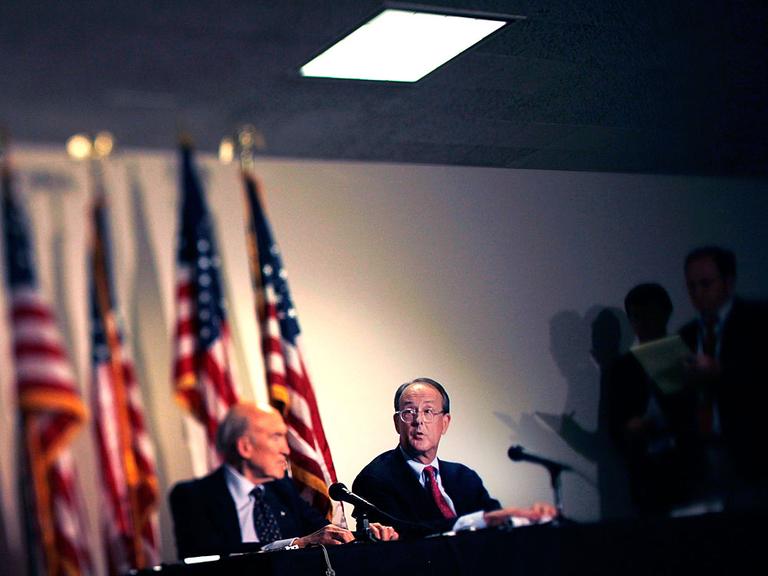Advertisement
Revised Debt-Cutting Plan Gets First Nods Of Support
A tough new cost-cutting playbook submitted by the co-chairmen of President Obama's debt commission has been embraced by Sens. Kent Conrad and Judd Gregg, the first two elected officials to endorse it.

As the commission convened Wednesday to discuss the co-chairmen's call for raising the Social Security retirement age, slashing spending and increasing the motor fuel tax, Conrad (D-ND) and Gregg (R-NH) said that despite their reservations, they feel the fiscal course of the country requires their support.
"There are no easy fixes here, so while I do not agree with all parts of the co-chairmen's final proposal, I will support it because it represents a step forward that we urgently need," said Gregg, who is retiring from the Senate. "Inaction on our debt crisis is not an option at this point."
Panel co-chairman Erskine Bowles said: "The era of debt denial and the denial of its consequences is over," adding, "we have started an adult conversation that will dominate the debate until the elected leadership in Washington does something real."
The National Commission on Fiscal Responsibility and Reform had planned to vote on the proposal Wednesday, but members delayed the final vote until Friday.
Divisions lingered on the commission, even as Bowles and co-chairman Alan Simpson unveiled a revised version (PDF).
Simpson, a former Republican senator from Wyoming, said he understands the predicament of lawmakers facing tough decisions, saying they must be ready to confront groups "waiting out there in temples around the city to shred this baby to bits." He told congressional members of the commission "there may be less cash in your Christmas stocking for the next election."
Resistance to the commission's austere debt-reduction recommendations is certain, not only because of the idea of raising the Social Security retirement age, but also because of proposed cuts to Medicare, curtailment of tax breaks and a doubling of the federal tax on a gallon of gasoline.
The plan faces opposition from many commission members. House Republicans appear uniformly against tax increases, while liberal Democrats like Jan Schakowsky of Illinois appear unlikely to be able to accept big cuts in federal programs for seniors.
Obama named the commission in hopes of bringing a debt-fighting plan up for a vote in Congress this year, but it appears to be falling well short of the 14-vote bipartisan supermajority needed.
A new version of the plan makes mostly minor changes to a draft that whipped up enormous controversy when unveiled earlier this month. Some domestic spending cuts are modestly higher than previously proposed, and health care savings from overhauling the medical malpractice system would reap less than proposed earlier this month.
Even with all of the sacrifices, the plan would fail to balance the budget — leaving a deficit of $421 billion in 2015 — but would stabilize the national debt at an economically sustainable level compared to the size of the economy.
Unlike their original proposal, Bowles and Simpson stop short of calling for caps on medical malpractice awards. Instead they recommend changes in how awards are made.
But other proposals remain the same. Among them are a gradual increase in the Social Security retirement age to 68 by 2050 and 69 by 2075, using a less generous cost-of-living adjustment for the programs and increasing the cap on income subject to Social Security taxes. The early retirement age would increase from 62 to 64 along the same timetable.
The plan also retains a 15-cent-a-gallon increase on gasoline, a three-year freeze on federal worker pay and the elimination of 200,000 workers from the federal payroll through attrition.
Other recommendations:
- Impose tight "caps" on the agency budgets adopted by Congress each year, including a near-freeze on the Pentagon's budget.
- Eliminate congressional pet spending projects known as "earmarks."
- Reduce the corporate income tax rate to 28 percent from 35 percent and stop taxing the overseas profits of U.S.-based multinational corporations.
- Overhaul individual income taxes and corporate taxes, giving Congress the choice of reducing the top rate to as low as 23 percent and no higher than 29 percent. The lower the rate, the fewer the tax credits and deductions that would be available to taxpayers.
Under one scenario proposed by Bowles and Simpson, taxpayers would face three tax brackets of 12 percent, 21 percent and 28 percent. Taxpayers would still be able to claim an earned income tax credit and child tax credit as well as all standard deductions and exemptions. Capital gains and dividends would be taxed at ordinary income tax rates. Taxpayers could claim a mortgage interest deduction up to $500,000, but only on their primary residence.
If Congress does not undertake a comprehensive overhaul of the tax system by 2013, the plan calls for a "fail-safe" provision that would trigger across-the-board reductions in tax breaks, designed to raise revenue by $80 billion in 2015 and $180 billion in 2020.
Bowles was White House chief of staff when former President Bill Clinton negotiated a balanced budget plan in 1997; Simpson is a former GOP senator. They could pick up support from nonelected deficit hawks like Democrat Alice Rivlin and Honeywell International's chief executive, David Cote, a Republican, who won't have to defend themselves to voters. Republican senators seem more likely to vote for the plan than their rigidly anti-tax-increase House counterparts.
A supermajority of 14 of the 18 panel members would have to approve recommendations for a possible vote in the lame-duck session of Congress. That seems out of reach, but Bowles says it's just as important to have jump-started a national debate on what it'll really take to bring the debt under control.
This program aired on December 1, 2010. The audio for this program is not available.